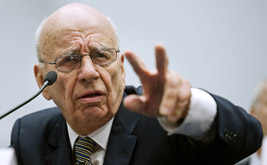Obama and the Indefinite Detention of US Citizens Obama and the Indefinite Detention of US Citizens
With the signing of the National Defense Authorization Act, the president has brought Guantánamo-style justice to the United States.
Jan 4, 2012 / Column / Alexander Cockburn
The Eurozone Meltdown The Eurozone Meltdown
The sooner Eurocrats dispense with their calls for more economic centralization, the better off we’ll all be.
Nov 30, 2011 / Column / Alexander Cockburn
What OWS Can Learn From the Greek Protests What OWS Can Learn From the Greek Protests
The movement’s urgent challenge is to meet organized repression with organized resistance.
Nov 2, 2011 / Column / Alexander Cockburn

Awlaki Assassination Puts Obama Above the Law Awlaki Assassination Puts Obama Above the Law
Welcome to the Drone Empire, in which the president's executioners can kill without legal restraint.
Oct 5, 2011 / Column / Alexander Cockburn

Secrets of the Keystone XL Pipeline Secrets of the Keystone XL Pipeline
Our country has no need for the Keystone pipeline extension.
Sep 7, 2011 / Column / Alexander Cockburn
Russian Hero Russian Hero
A bet on a horse in the 1949 Grand National resulted in the largest collective transfer of wealth ever to communism's stalwarts in Britain.
Jul 27, 2011 / Books & the Arts / Alexander Cockburn
Libya: An Old-Fashioned Colonial Smash-and-Grab Libya: An Old-Fashioned Colonial Smash-and-Grab
There is ferocious repression across the Middle East. Why are the UN's sights trained only on Libya?
Jun 8, 2011 / Column / Alexander Cockburn
Welcome to Obama’s 2012 Campaign Welcome to Obama’s 2012 Campaign
To launch his reelection bid, the president took up a longstanding American tradition: extrajudicial political assassinations.
May 11, 2011 / Column / Alexander Cockburn

Rupert Murdoch’s Watergate Rupert Murdoch’s Watergate
An invasion of privacy scandal threatens the careers to two of Murdoch's top executives and the apparent heir the News Corp. empire.
Apr 14, 2011 / Column / Alexander Cockburn
From Chernobyl to Fukushima: What Will It Take? From Chernobyl to Fukushima: What Will It Take?
There are no effective “safeguards” against nuclear disasters, and Japan’s crisis is only the latest display of the overwhelming risks involved in splitting atoms for energy.
Mar 17, 2011 / Column / Alexander Cockburn
